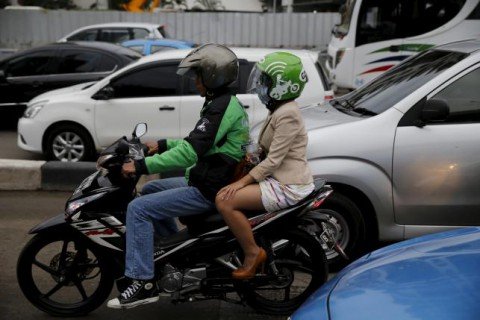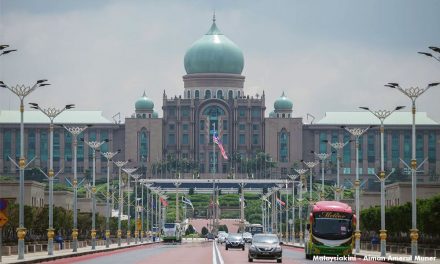Watch out, Uber. GoJek is taking over Jakarta, one motorbike at a time.
Similar to app-based taxi (or chauffeur) service Uber, GoJek is a smartphone-based service that allows users to hail a driver to bring them to their destination. There’s only one difference: instead of sliding into the backseat of a car, customers hop onto the back of a motorbike.
Its popularity stems from the fact that it gets customers more quickly through traffic jams compared to cars, on bikes that are newer and safer than standard “ojeks”, buses or rickshaws that are often shabby and dilapidated. Passengers have their fare calculated upfront, sparing the need for haggling, and details of their driver (name, contact number, and photo) are provided upon booking. The company’s motorbike drivers are outfitted in distinctive green jackets and helmets, making them easily recognizable among the throngs of motorcyclists during rush hour.
GoJek was launched in 2011, but underwent a revamp that gave the mobile app a brand new look. The mobile app derives its name from Jakarta’s army of ubiquitous motorbike taxis, commonly known as “ojeks”. They have occupied street corners and curbs in the Indonesian capital for decades, but always operated informally without safety standards or pricing guidelines. Jakarta is the largest city in the world without a subway or mass rapid transit system – although one is under construction and set to complete in 2018 – causing massive gridlock in a city that sees millions going to work in the city every morning.

A Gojek driver pillions a customer as he rides his motorcycle through a business district street in Jakarta, June 9, 2015. (REUTERS/BEAWIHARTA)
Jakarta’s traffic was rated worst in the world in a study by motor-oil firm Castrol this year, based on an analysis of stopping and starting by drivers. Commuters spend three to four hours a day stuck in traffic, and the average speed of traffic is 8.3km per hour. (To put that in perspective, Malaysians are stuck in traffic jams an average of two hours daily, and 8.3 km/hr is slower than a runner of average fitness covering the same distance in a race.)
Within the past six months, GoJek has seen its number of drivers increase tenfold from 1,000 to 10,000, and the app has been downloaded almost 400,000 times, making it the most popular app in Indonesia for both iOS and Android. In a city of 10 million, many of whom are tech-savvy young Indonesians, the business has much potential for growth.
However, just like Uber in other cities, GoJek also has its share of critics and detractors. The app-based service has antagonized traditional drivers who cannot compete with the price and feeling the pinch of having their customers opting for the services of GoJek’s green-clad bikers. It was forced to release a statement this month condemning threats of violence made against its drivers. The city’s governor has also been criticised for publicly throwing his support behind the venture.
GoJek also faces competition from Southeast Asian taxi-hailing app GrabTaxi, which launched a ‘copycat’ motorcycle service called GrabBike in May, offering free rides and with drivers donning green uniforms similar to GoJek’s signature colour.
Founder and CEO of GoJek, Nadiem Makarim (who is a Harvard graduate and has an impressive resume), says the app isn’t the answer to solving the city’s traffic gridlock, but hopes it can help to ease it. “I would happily shut down GoJek if Jakarta could solve its traffic problems,” said Makarim. “Unfortunately, it’s virtually impossible to solve in the next 10 years.”







